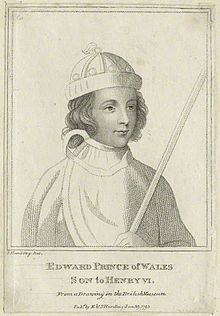Edward of Westminster
Edward of Westminster, Prince of Wales (born October 13, 1453 in the Palace of Westminster , † May 4, 1471 in the Battle of Tewkesbury ) was the only child of King Henry VI of England . and from his wife Margarete von Anjou . He was born with the title Duke of Cornwall .
His parents married in 1445 when the mental derangement of Henry VI. as heir of his grandfather Charles VI. from France had already erupted in phases. Edward's mother Margarete very quickly came to terms with the leading court party under Edmund Beaufort , whose greatest opponent - after eliminating some family relatives of the Lancaster line - was Richard Plantagenet, 3rd Duke of York . When the queen unexpectedly became pregnant in 1453, rumors began to circulate that the child was born of a love affair with a stranger. Henry VI. recognized however Edward as his son, so that this 1454 could be appointed fifth Prince of Wales . A little later, the Wars of the Roses began with the first Battle of St Albans in 1455.
In 1460, after the Battle of Northampton and his triumphant entry into London , York became the official heir to the throne, circumventing Edward's legitimate rights. Margarete responded with the help of Lancaster loyalists by re-establishing an army that could defeat York in the Battle of Wakefield , which also fell in that battle. In 1461 York's eldest son Edward, Earl of March, took the throne and assumed the title of Edward IV. Margaret fled with her son to Scotland , Wales and finally France , where she waited for her hour to help Edward achieve his rights.
In 1470, Richard Neville, 16th Earl of Warwick , called the "kingmaker", who had contributed significantly to Edward's accession to the throne, changed sides and helped Henry VI. again on the throne. In addition, Edward was married to Warwick's daughter Anne Neville in December 1470 . It is not clear whether this marriage was consummated.
On April 14, 1471, Edward IV, who had returned from his exile, defeated Neville's troops at the Battle of Barnet , and the kingmaker died in battle. Margarete, accompanied by her now grown-up son, had meanwhile raised another army. The news of Warwick's defeat at Barnet demoralized Margaret and Edward's troops so much that the only option was a retreat to Wales, from where it was hoped for troop support. At Tewkesbury, Edward IV caught up with the Lancaster army, the followers of Henry VI. had to face the fight. The Battle of Tewkesbury on May 4, 1471 ended in disaster; Margarete was taken prisoner, practically all of Lancaster's military commanders died in battle or were subsequently executed.
There are different versions of Edward's death. For one, it is possible that he died right in battle. Other accounts state that he was caught on the run by Yorkists. According to the Warkworth Chronicle, a sub-variant of this is the capture by soldiers in the presence of George Plantagenet , Edward IV's younger brother, whom Edward pleaded for mercy, but the prince was slain by the soldiers. A second and considerably more recent sub-variant according to the Hall Chronicle speaks of a capture and a meeting with Edward IV. During the meeting, Edward irritated the king, who then hit him. Clarence and the king's youngest brother, Richard, Duke of Gloucester , and William Hastings then killed the prince. The second variant seems rather fictional due to the time lag and the lack of contemporary sources, but it certainly helped shape the image of Gloucester as an unscrupulous murderer that was coined in the Tudor period. However, this representation is supported in part, if not in relation to the person, by a recently found French copy of Arrival , which could be contemporary and according to which Edward was confronted the king with a crown and immediately struck down. In any case, Edward is the only Prince of Wales who should fall in battle. He was buried in Tewkesbury Abbey.
Henry VI. was murdered a little later in the Tower, with which the House of Lancaster was finally extinguished, even if the Tudors later dynastically invoked it.
Edward's widow Anne had also been captured and later married Gloucester, making her Queen of England through his coronation in 1483.
Individual evidence
- ^ Trevor Royle: The Wars of the Roses; England's first civil war. Abacus, London, 2009, ISBN 978-0-349-11790-4 , p. 447
- ^ English Historical Documents , IV, 1327-1485, editor AR Myers, 1969, p. 314f
- ↑ Richard III's Books , AF Sutton and L. Visser-Fuchs, Stroud, 1997, Plate IX, from Besançon MS 1168
Web links
- Edward Plantagenet, Prince of Wales, on thepeerage.com , accessed July 26, 2015.
| predecessor | Office | successor |
|---|---|---|
| Henry VI. |
Prince of Wales Duke of Cornwall Earl of Chester 1453–1471 |
Edward V. |
| personal data | |
|---|---|
| SURNAME | Edward of Westminster |
| ALTERNATIVE NAMES | Edward, Prince of Wales |
| BRIEF DESCRIPTION | Heir to the throne in England |
| DATE OF BIRTH | October 13, 1453 |
| PLACE OF BIRTH | Palace of Westminster |
| DATE OF DEATH | May 4, 1471 |
| Place of death | Battle of Tewkesbury |
